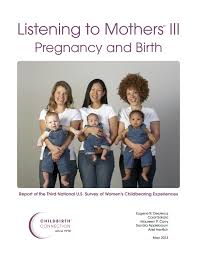 Have you heard of the Listening to Mothers Initiative? It is an incredible resource for doulas, childbirth educators and other maternity and postpartum care professionals (including medical providers)! This online survey of 2,400 women who gave birth in American hospitals between July 1, 2011 and June 30, 2012 is chock full of very valuable information on everything from women’s expectations to their actual experience of pregnancy, birth and the postpartum period. The data collected even sheds light on where expectant women search for and obtain information on care providers and professional support services.
Have you heard of the Listening to Mothers Initiative? It is an incredible resource for doulas, childbirth educators and other maternity and postpartum care professionals (including medical providers)! This online survey of 2,400 women who gave birth in American hospitals between July 1, 2011 and June 30, 2012 is chock full of very valuable information on everything from women’s expectations to their actual experience of pregnancy, birth and the postpartum period. The data collected even sheds light on where expectant women search for and obtain information on care providers and professional support services.
The full 94 page report (Listening to Mothers III Pregnancy and Birth Survey and Report) is available from Childbirth Connection as is a follow-up survey report called New Mothers Speak Out which is focused on the postpartum period.
With so much data, we’ll cover the highlights in two posts here at The DONA Doula Chronicles with the first outlining survey information on pregnancy and birth relevant to doulas. Check back next week for the second part on the postpartum period.
Pregnancy and Birth (Listening to Mothers III)
Most survey participants rated maternity care providers as “very valuable” sources of information (82% of experienced mothers and 76% of first time mothers). This suggests that most of our clients place a high level of trust in the information they receive from their care provider. It is important that as doulas we provide evidence-based information without challenging care providers or undermining our clients’ relationship with their medical team.
More than half (53%) attended a childbirth education class. Yet, many indicated they were “not sure” when asked about specific risks related to labor induction and cesarean sections, such as future placenta problems, breathing problems in baby, inducing because of anticipated baby size and the affect of induction on the likelihood of delivery via cesarean. Doulas play a valuable role in supplementing childbirth education classes, particularly on the risks associated with interventions.
The most commonly cited reasons for not asking questions of medical providers were: 30% because the provider seemed rushed, 23% were concerned that their provider might think they were being difficult and 22% because the woman felt that what she wanted for her care was different from what her provider wanted. These answers underscore the important role doulas play in supporting clients to advocate for their desires and feel confident enough to ask questions about their care.
Nearly all mothers who completed the survey said they had supportive care during labor. A partner or husband filled this role for 77% of women, nurses for 46%, another family member or a friend for 37% and a doctor for 31%. Just 6% received the support of a doula, but 75% of those who did not have a doula had heard about doula support. Of those, 27% said they would like to have had the support of a doula. While we can’t know why so many women birth without the support of a doula, these numbers are very encouraging in terms of awareness of the role of a doula and recognition of the value of our support.
43% of respondents indicated they walked around after being admitted to the hospital while experiencing regular contractions. Doulas know the value of movement in labor!
Of those who birthed via cesarean delivery, less than 2% said they made the decision for this birth method before labor began and without a medical reason for this choice. For first time mothers birthing via cesarean section, 63% reported that their doctor was the decision maker in choosing their type of delivery. The myth of maternal choice for cesarean delivery continues to be debunked by research.
Mothers who had an induction or cesarean birth reported pressure to have those interventions more often (25%) than those who did not (8%). Can increased education on induction and c-sections help mothers feel less pressure? Could support in advocating for themselves and asking questions of their care team so they better understand and participate in the decision-making process help?
Of women whose most recent birth was a repeat cesarean, 60% reported that they had a discussion with their care provider about why they should have a vaginal birth after cesarean while 97% reported discussing why they should have a repeat cesarean. Doulas can start the conversation with families after a primary c-section during postpartum visits to help lay the foundation for planning for the next birth.
We’ll have more from the Listening to Mothers survey next week, don’t miss it!

